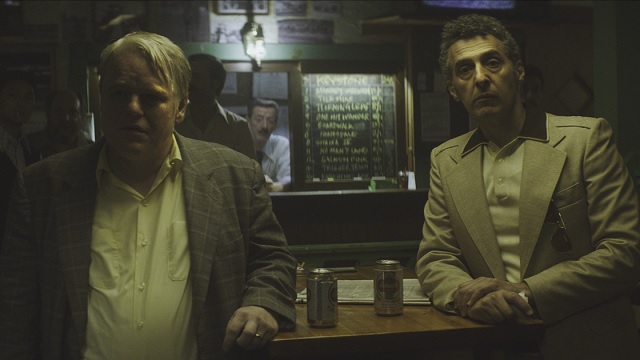Written by John Slattery and Alex Metcalf
Directed by John Slattery
USA, 2014
Whatever its initial intentions were, it’s now impossible to watch John Slattery’s feature directorial debut God’s Pocket without feeling intensely depressed due to the presence of its leading actor, the late Philip Seymour Hoffman. It’s not his last film overall–that’ll be A Most Wanted Man, later this year–but God’s Pocket is one of our last chances to witness Hoffman working as an actor. As such, it’s more than a little unfortunate that this is a tepid and unsatisfying ensemble drama. Hoffman’s character is at its center, but the stories surrounding him and the rest of the impressive ensemble cast never coalesce into something legitimately compelling.
Hoffman plays Mickey Scarpato, whose meat business is often used as a front for more criminal activities. As the film begins, he lives in marital familiarity, if not bliss, with his wife Jeannie (Christina Hendricks), but tragedy soon strikes when her son (and his stepson) Leon is killed at the construction site where he works by a black co-worker who lashes out when Leon hurls an epithet at him unapologetically. Though the audience sees how the murder plays out, Mickey and Jeannie are told Leon died in an accident; Jeannie presumes, correctly, that something else is going on and vociferously encourages Mickey to use his more lowbrow friend (John Turturro) to call in a favor with a local criminal and get to the bottom of Leon’s death. In the midst of this, Mickey desperately tries to scrounge up enough cash to pay for Leon’s funeral, all while a soused newspaper columnist (Richard Jenkins) stumbles through the titular hamlet, sleeping with younger women while trying to come up with more copy.
God’s Pocket feels like a set of short stories that were strung together with connective tissue, and just barely; though Slattery’s directed a handful of episodes of Mad Men, where he co-stars with Hendricks, the script he co-wrote with Alex Metcalf for this film based on the novel by Pete Dexter has trouble balancing tones of black comedy and grim familial drama. Leon’s death is initially played as a case of justice being exercised viciously. Caleb Landry Jones, who plays the young man briefly, does such an excellent job of making Leon seem like absolute scum that it’s not terribly depressing when someone takes him down a peg. But soon, as Mickey struggles to find a holding place for his stepson’s corpse, the plight is played for dark laughs. It’s not that God’s Pocket shouldn’t indulge in multiples tones; however, the constant shift just makes the film feel unfocused. And while Slattery’s directorial work on Mad Men has been solid overall, the oppressively drab visuals here, even if they’re intentional, are simply unpleasant. Almost every scene looks so dimly lit, it’s almost hard to see beyond the brown-and-green palette.
The cast, predictably, acquits itself admirably. Hoffman’s Mickey is fairly low-key and seems like one of the few voices of sanity throughout; a theme in the film is that the people of God’s Pocket look upon outsiders rudely, and Mickey is one of those outsiders. (Jenkins’ journalist, even though he’s deified early on for his supposedly accurate portrayals of the God’s Pocket citizenry, is also an outsider.) As such, Mickey feels less idiotic than his peers, and just hapless. Hoffman, like the rest of the cast, is fine in the film. However, because all of the storylines are seemingly warring for dominance throughout, and only barely come to a head by the end, there’s not enough time for anyone to shine through. Everyone involved in God’s Pocket is capable of greatness, but none achieve it here. It’s a shame that one of Philip Seymour Hoffman’s last projects is something this shaky, but at least we got 90 more minutes with him.
— Josh Spiegel



